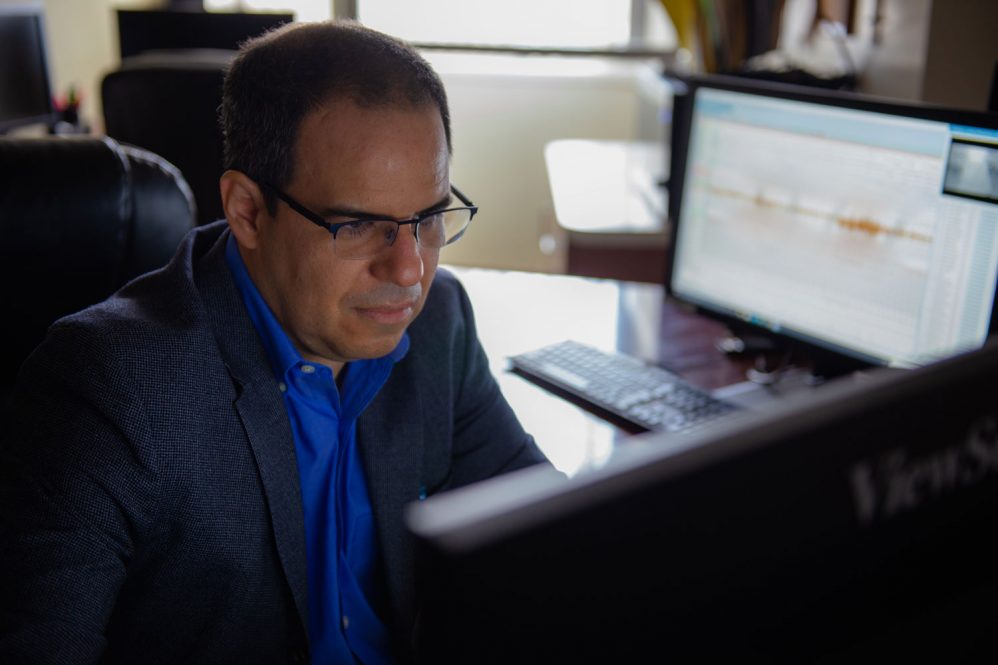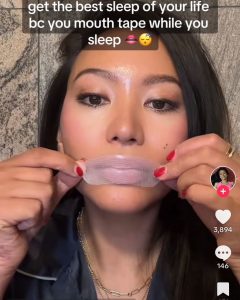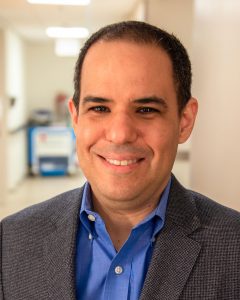'I do not recommend that practice at all,' says Dr. Adrian Salmon from UConn Health's Sleep Disorders Center

Dr. Adrian Salmon analyzes a sleep study at UConn Health. (Tina Encarnacion/UConn Health photo)
Sleep experts will discourage looking at social media in bed. And now that one platform appears to be perpetuating a trend of taping your mouth shut before you go to sleep, some might discourage looking at social media at all.

Physicians in UConn Health's Sleep Disorders Center find it troubling that videos on TikTok may give the impression that mouth taping is a good strategy to improve sleep.
"There is no solid scientific evidence to support this pervasive practice," says Dr. Adrian Salmon, the center's director. "I do not recommend that practice at all. It does not cure sleep apnea, and for some patients, it can be dangerous, especially for patients with chronic nasal congestion or sinusitis, allergies, or chronic medical problems such as heart and lung disease."
Sleep apnea is a condition in which your breathing is interrupted repeatedly during the night, keeping you from achieving the deep, restful sleep your body needs. Those with sleep apnea tend to snore throughout the night, and awaken frequently to recapture their breath.
This idea behind mouth taping is to reduce snoring by forcing you to breathe through your nose instead of your mouth. Salmon says if you're mouth breathing during sleep, it's probably a sign you already have problems breathing through your nose, and taping your mouth makes that worse.
If it was so easy to fix snoring, why was it not recommended before by any health care provider? — Dr. Adrian Salmon
"Imagine, if you tape your mouth, it will be difficult to open your mouth if the flow of air decreases through your nose," Salmon says. "You definitely will be in significant distress if you are a mouth breather at night or have nasal congestion due to cold or allergies during mouth taping.
"Nonetheless, when breathing difficulties arise in the middle of sleep, you will wake up and remove the tape; our brain protects us from asphyxiation during sleep. However, this nocturnal stress might not be well tolerated in the elderly or in patients with significant chronic medical conditions."

Nasal decongestants, sleeping on your side, or elevating your head when sleeping on your back are among the doctor-recommended ways to decrease snoring intensity to an extent.
But a better understanding of snoring may be helpful.
"Snoring is the vibration of soft tissues in our throats when the space for passing air is reduced," Salmon explains. "Snoring is common and does not mean sleep apnea all the time. However, sleep apnea may need to be investigated if your sleep quality is reduced or if your daytime activities are affected due to somnolence or fatigue. One common risk factor for snoring in adulthood is obesity; sometimes, significant weight loss may decrease snoring."
What may be of equal importance is that the mouth-taping trend on TikTok can serve as a reminder of why we shouldn't rely on social media for sound medical advice.
"Some challenges and information in social media can be detrimental to our health, and it is important to check social media information with reliable sources, like patient information from medical organizations or directly with your health care providers," Salmon advises. "However, there are some challenges that we just need to ask ourselves common-sense questions. Mouth taping is an example: If it was so easy to fix snoring, why was it not recommended before by any health care provider?"
While the approach may be flawed, perhaps this is a sign that we're getting better at recognizing the importance of making sleep a greater priority. What if we could take the curiosity about mouth-taping and harness that energy for good, and simply go back to basics?
"Certainly, healthy habits in our lives, such as a balanced diet, exercise, and avoiding social media and electronics at bedtime, will improve our sleep quality," Salmon says.






